Hacker Perspective: Religion and philosophy
About me: I was raised in an Evangelical Lutheran family and culture. As an adult, it is obvious to me that much of the doctrine imparted to Christian children cannot possibly be true. Not only is the view supported by the fathers of the European enlightenment, but also Saint Paul who wrote "When I was a child, I talked like a child, I thought like a child, I reasoned like a child. When I became a man, I put the ways of childhood behind me". So today call myself a Unitarian on even days and Deist on the remainder.
Speaking of fictions, "the story" of the Puritans first landing in an empty world at Plymouth Rock in 1619 conflicts with "the fact" that Indigenous peoples were already here in the many tens of millions -AND- that the Spanish and Portuguese began colonization of what are now known as the southern states not long after the first voyage of Christopher Columbus in 1492. It also ignores "the fact" that Europeans started colonizing what are now known as "the northern states and Canada" after the 1497 voyage of John Cabot. The French were living in Quebec in 1608.
Many American citizens are not aware of the following fact (while some American Christians prefer to ignore it): The First Amendment to the American Constitution (1789) begins:
"Congress shall make no law respecting an establishment of religion, or prohibiting the free exercise thereof; or abridging the freedom of speech, or of the press; or the right of the people peaceably to assemble, and to petition the Government for a redress of grievances."The first 16 words comprise the Establishment Clause which places a clear separation between church and state (The state must never get involved in your religion; Your religion must never get involved with the state for fear of cross contamination with other citizens and their beliefs). This is the first known legal document exposing the benefits of The Enlightenment.
 |
| Colin Powell (2003) and Nikki Haley (2017) selling religious war at the United Nations. |
Objectively looking at our world today, we see there are literally billions of people who believe man-made books that are steeped in ancient fear, ignorance and nonsense while claiming to be God's communication with humanity. Books which promote religious violence on a global scale. and which teach that The Supreme Intelligence/God ordered people to commit acts of genocide against their neighbors. Is it any wonder our world today suffers from so much religious violence?
All of the Abrahamic "revealed" religions (Judaism, Christianity, and Islam) have "holy" scriptures which promote religious violence. The Abrahamic "revealed" religion that arguably has the most influence on US government policy makers, policy makers who have the very real ability to start wars, is Judaism. This is due primarily to the raw political power of the Israel lobby and to the Hebrew Bible/Old Testament based neoconservative movement.
These two powerful and influential organizations were successful in getting US politicians from both parties to start the Iraq War for the benefit if the Jewish state of Israel. They are now working, in much the same way as they did 15 years ago to start the Iraq War, to get US politicians to start a war for the same reasons against Iran.
Fifteen years ago Lawrence Wilkerson was US Secretary of State Colon Powell's chief of staff. He was involved in helping Powell sell the lie that Iraq had nuclear and biological weapons of mass destruction to win support for a US war against Iraq. Wilkerson has written an important article in the New York Times about the parallels between that successful effort to start the Iraq War and the current effort to start a war against Iran. (Click here for an article about the pro-Israel editorial policy of the New York Times)
comment: only uneducated fools are anti-Semitic. The author of this blurb is criticizing Zionism which many people see as another word for colonialism.
Now the vital importance of Deism becomes clear. If enough people were educated about Deism and held Deistic beliefs instead of nonsensical and harmful beliefs promoted by the "revealed" religions, it would be much more difficult for world powers to wage religious wars. We would have a much better world for ourselves and for future generations.
Thought-provoking Quotes
I believe in an America where the separation of church and state is absolute, where no Catholic prelate would tell the president (should he be Catholic) how to act,
and no Protestant minister would tell his parishioners for whom to vote; where no church or church school is granted any public funds or political preference; and
where no man is denied public office merely because his religion differs from the president who might appoint him or the people who might elect him.
I believe in an America that is officially neither Catholic, Protestant nor Jewish; where no public official either requests or accepts instructions on public policy
from the Pope, the National Council of Churches or any other ecclesiastical source; where no religious body seeks to impose its will directly or indirectly
upon the general populace or the public acts of its officials; and where religious liberty is so indivisible that an act against one church is treated as an act
against all.
speaks on the Separation of Church and State
(September 12, 1960)
Biblical text should not be interpreted as properly literal, but rather as metaphorical, if it contradicts what we know from science and our God-given reason.
(Augustine of Hippo, De Genesi ad literam 1:19-20, Chapt. 19 [408], De Genesi ad literam, 2:9)
Saint Augustine (354-430 A.D.)
The bible explains how to go to heaven, not how the heavens go.
Galileo Galilei (1616)
Those who can make you believe absurdities can make you commit atrocities.
Voltaire
Man is a Religious Animal. He is the only Religious Animal. He is the only animal that has the True Religion - several of them. He is the only animal that loves his neighbor as himself then cuts his throat if his theology isn't straight.
Mark Twain
Hundreds of professional and amateur scientists actually believe that the Bible pretends to teach science. This is a good deal like assuming that there must be authentic religious dogma in the binomial theorem.
Georges Lemaître (1933) Roman Catholic priest and Scientist (who first proposed the Big Bang after analyzing the mathematics behind Einstein's General Theory of Relativity)
Properly read, the Bible is the most potent force for atheism ever conceived.
Isaac Asimov
Fundamentalism is the blind lunge towards oversimplification.
George Steiner (Philosopher)
Ours is a time of space telescopes, electron microscopes, supercomputers, and the worldwide web. This is not a time for parsing lessons given to a few goat herders, tent makers and camel drivers.
Rev. Michael Dowd, "Thank God for Evolution!"
Theists are convinced God exists; philosophers are convinced God does not exist; Deists are skeptics sitting between the two extremes.
This is a composite quote. The first two segments come from Edward Gibbon (1737-1794). The third segment came from Leo Damrosch
My "2 cents" on religious world conflict
Europeans learned during the 30 Years War (1618-1648)1 that religion and politics don't mix. In fact, it was the principal of religious freedom2 that was the basis for ideas which created the United States of America. So, I'm confused when:
- the USA enthusiastically supplies arms to a democratic theocracy (Israel) who is in a war with a group of people trying to become a democratic theocracy
(Palestine). On the flip side, Palestine receives and uses arms supplied by Iran and Syria against Israel while their own people starve in the streets dreaming of the
afterlife.
- the USA is best friends with a tribal theocracy (Saudi Arabia) who look the other way while Saudi religious police engage in kidnappings in the name of Sharia Law.
To make matters worse, Saudi Arabia is the largest purchaser of US military hardware and are most likely supplying weapons to ISIS (Islamic State In Syria) and ISIL
(Islamic State in Libya).
comment: so just as the US and USSR created many problems in the middle-east by fighting a proxy-war during the 1980s in Afghanistan, Saudi Arabia (Sunni) is fighting a proxy war with Iran (Shia) in Libya and Syria. To make matters worse, American arms sold to Saudi Arabia are being used to attack people in Yemen. What do you suppose happens when anyone loses their home or family then trips over a piece of metal stamped "Made in U.S.A."? You guessed it: lifelong enemy waiting for an opportunity to enact revenge on the United States, their allies, or Americans.
- many Americans today reject science and logic while openly embracing religious fundamentalism (including a literal belief in Bible scripture) and political extremism. They even claim that America was founded on Christian principles even though many of the US Founding Fathers (Washington, Adams, Madison, Jefferson, Franklin, etc.) were Deists. The joke (perhaps irony is a better word here) gets better when Ronald Reagan, who becomes president with help from fundamentalist Christian groups organized by people like Jerry Falwell, quotes a few lines from Thomas Paine during his inauguration. (Many religious people, then and now, labeled Thomas Paine an atheist even though Paine was a self-described Deist)
The world will never have peace until there is a protestant-style reformation in all religions which will enable people to take back control of their churches from zealots and extremists. Every citizen must strive to ignore anyone (religious or otherwise) who instigates war or martyrdom. We also must be wary of any religious person with "political ambitions" or "ties to people with political ambitions" (you probably think I am referring to some Islamic Imams and Clerics but American Christians like Jerry Falwell also spring to mind)
Subscripts:- in this war, Catholics and Protestants fought each other for the bodies, souls, and property of the other group. A whole generation passed until the children of the people who started the war put a stop to the madness.
- in this context "religious freedom" can be rephrased as "each citizen being free of the other person's religion"
Two more cents
Islam
After the 9/11 attacks on New York in 2001, I read three books on Islam as well as Islamic History to attempt to understand Islam's principles. While contemporary Muslims usually refer to Mohamed only as a prophet, he was also a politician as well as a military general. This perspective sheds new light on Muslim discontent which obviously extends beyond religion into theocracy.
Most Muslims consider any Quran not written in Arabic to be profane translations. This means that imams and clerics not able to read Arabic must turn to the hadiths (non-Arabic translations are allowed) which number between 4000 and 8000. Demanding that the primary holy text stay in the original language is reminiscent of pre-protestant Christianity demanding that the Bible stay in Latin (even though the original old testament scrolls were only available in mostly Hebrew or Aramaic, and the new testament scrolls only in Greek)
Christianity
Next, I read three books on Christianity which rendered me equally confused. Mention "the big schism in Christianity" and most modern people with think "Catholic vs. Protestant" rather than "Eastern Orthodox vs. Roman Catholic"
A very simple summary involves the Trinity (a word never found in the bible) which is derived from the evolution
of the Nicene Creed (publicly recited in churches as an affirmation of what the attendees believe) which first
appeared in 325 A.D. The Trinity controversy begins with the insertion of the Filioque in 451 A.D. at the First
Ecumenical Council at Chalcedon making Jesus literally divine. In a theocratic power play in 1054
(was this religious or political?) the Roman Catholic church excommunicated Christian churches who did not accept Filioque which resulted in a spit between Roman
Catholic and Greek Orthodox. If the Greek church is labeled "orthodoxy" (straight thinking) then the Roman
Catholic doctrine, and everything descended from it (Anglicans, Baptists, Calvinists, Lutherans, Methodists, and Pentecostals to only name six of many), are "heretical"
Food-for-thought: many protestants scoff at the catholic practice of "praying to Mary" but if belief in the divinity of Jesus is heretical, then
"praying to Jesus" should also be discouraged. As far as I can tell, the Muslim world prays to Allah rather than Mohammad which may be more correct (especially if Allah
is just another name for God)
Our Modern World
 The age
of enlightenment was kicked off by Europeans like Spinoza (1632-1637) who laid the groundwork for the
18th century Enlightenment and modern biblical
criticism (an open minded scholarly study and investigation of biblical writings seeking to make discerning judgments about these writings). For most of Europe,
this put an end to governments recognizing "superstition" and supporting acts like "witch burning". Roman Catholics behaved badly with the inquisitions
until Napoleon put a stop to the last one (of five) in Spain. Spinoza's enlightenment continued in 18th and 19th century Europe where many more original bible
manuscripts (scrolls) were acquired then compared with ancient historical records and found to be changed or just plain wrong.
The age
of enlightenment was kicked off by Europeans like Spinoza (1632-1637) who laid the groundwork for the
18th century Enlightenment and modern biblical
criticism (an open minded scholarly study and investigation of biblical writings seeking to make discerning judgments about these writings). For most of Europe,
this put an end to governments recognizing "superstition" and supporting acts like "witch burning". Roman Catholics behaved badly with the inquisitions
until Napoleon put a stop to the last one (of five) in Spain. Spinoza's enlightenment continued in 18th and 19th century Europe where many more original bible
manuscripts (scrolls) were acquired then compared with ancient historical records and found to be changed or just plain wrong.
quote: this school reached its apogee with the influential synthesis of Julius Wellhausen (1844-1918) in
the 1870s, at which point it seemed to many that the Bible had at last been fully explained as a human document.
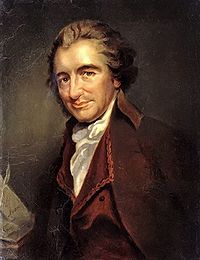 Although many people continued the enlightenment
efforts of Spinoza, including John Locke (1632-1704) and David Hume (1711-1776) to only name two of many, Thomas Paine (1737-1809) is the name
most citizens might recognize today. He wrote many things including "the importance of the separation between church and state" and "racial equality" (he proposed
"abolishing slavery 100 years before Lincoln").
Although many people continued the enlightenment
efforts of Spinoza, including John Locke (1632-1704) and David Hume (1711-1776) to only name two of many, Thomas Paine (1737-1809) is the name
most citizens might recognize today. He wrote many things including "the importance of the separation between church and state" and "racial equality" (he proposed
"abolishing slavery 100 years before Lincoln").
- The following three titles are a "must read" for all modern citizens:
- 1776 Common Sense (American Revolution)
- 1791 Rights of Man (French Revolution)
- 1794 The Age of Reason (Enlightenment).
- Part-1 was written while under arrest in France awaiting the guillotine.
- Part-2 was written in 1796.
- Online resources:
- To Begin the World Over Again: Thomas Paine and the American Founding (lecture)
- To Begin the World Over Again: The Life of Thomas Paine (DVD)
Some noteworthy deists include: George Washington, James Madison, Thomas Jefferson, Ben Franklin, and perhaps John Adams. All these people knew, or had read the works of, Thomas Paine.
comment: Most of the American founding fathers were deists and anyone who tells you otherwise is lying (even if you heard it from the pulpit). If you don't believe me then you should start by first reading the Treaty of Tripoli which was ratified unanimously by the U.S. Senate on June 7, 1797 and signed into law by President John Adams on June 10, 1797.
quote: As the Government of the United States of America is not, in any sense, founded on the Christian religion,—as it has in itself no character of enmity against the laws, religion, or tranquility, of Mussulmen [Muslims],—and as the said States never entered into any war or act of hostility against any Mahometan [Muslim] nation, it is declared by the parties that no pretext arising from religious opinions shall ever produce an interruption of the harmony existing between the two countries.After this treaty was published in ~ 200 newspapers it should be noted that there is no record of any public outrage of any kind.
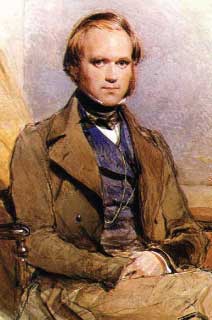 Although Charles
Darwin started out a Christian (he graduated with a degree from Trinity College, Cambridge and was destined to be an Anglican Parson) he became a deist after
questioning the premature death of three of his ten children before publishing On the Origin of the Species in 1859. Meanwhile, most Anglican Parsons and Deacons who read Darwin's
book did not see it as an attack on religion; they saw it as science's description of nature which had been put into motion by a prime-mover God.
Although Charles
Darwin started out a Christian (he graduated with a degree from Trinity College, Cambridge and was destined to be an Anglican Parson) he became a deist after
questioning the premature death of three of his ten children before publishing On the Origin of the Species in 1859. Meanwhile, most Anglican Parsons and Deacons who read Darwin's
book did not see it as an attack on religion; they saw it as science's description of nature which had been put into motion by a prime-mover God.
But here is another view where some people say evolution is actually described in Genesis 1-24:
www.skepticsannotatedbible.com/interp/evolution.htmlNotice that he "brings forth" rather than "creates".
quote: And God said, Let the earth bring forth grass, the herb yielding seed, and the fruit tree.
I now call myself a Desist who is convinced that all religions are completely man-made. Like literature, music and art, religion is just another human cultural expression and humanity would, most likely, be poorer without it. Since no rational person would ever "torture", "murder" or "go to war" over literature, music or art, then those who believe these activities are permitted in the name of religion need to be educated otherwise. No one will ever be able to prove (or disprove) the existence of God so there is little point in trying. Meanwhile arguing about the inaccuracies found in all religious writings makes me think that humanity's only hope is to keep personal religious beliefs private. This means we must all strive for a secular society.
Humanity's Coming Dark Age (a warning)
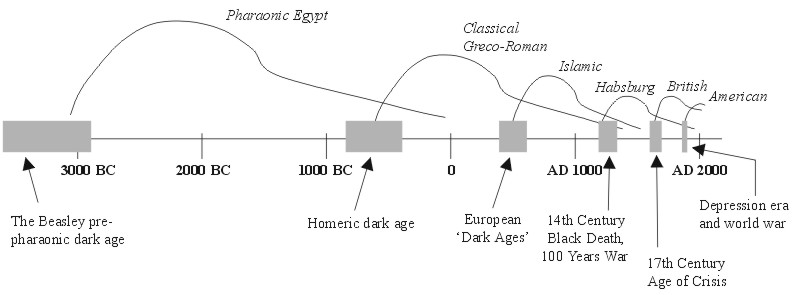
The Rise and Fall of Empires (published: 2003-01-29)
Click here to read more
Useful Links (and a few departing points)
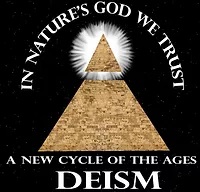
- Deism
- belief in a God who created the world but has since remained indifferent to it.
- wikipedia.org/wiki/Deism
Deism [ dee-iz-uh m ] is the belief that reason and observation of the natural world are sufficient to determine the existence of God, accompanied with the rejection of revelation and authority as a source of religious knowledge. Deism gained prominence in the 17th and 18th centuries during the Age of Enlightenment—especially in Britain, France, Germany and America—among intellectuals raised as Christians who believed in one god, but found fault with organized religion and could not believe in supernatural events such as miracles, the inerrancy of scriptures, or the Trinity. Deism is derived from deus, the Latin word for god. The earliest known usage in print of the English term deist is 1621, and deism is first found in a 1675 dictionary. Deistic ideas influenced several leaders of the American and French Revolutions. Two main forms of deism currently exist: classical deism and modern deism.
- Most of the American "Founding Fathers" including Benjamin Franklin, Thomas Jefferson, George Washington, and James Madison were Deists (John Adams was a Unitarian). Adding to this list are the revolutionary writer Thomas Paine and US Civil War president Abraham Lincoln.
- Some Christian Deists claim that Jesus was a Deist.
- World Union of Deists God gave us reason, not religion.
-
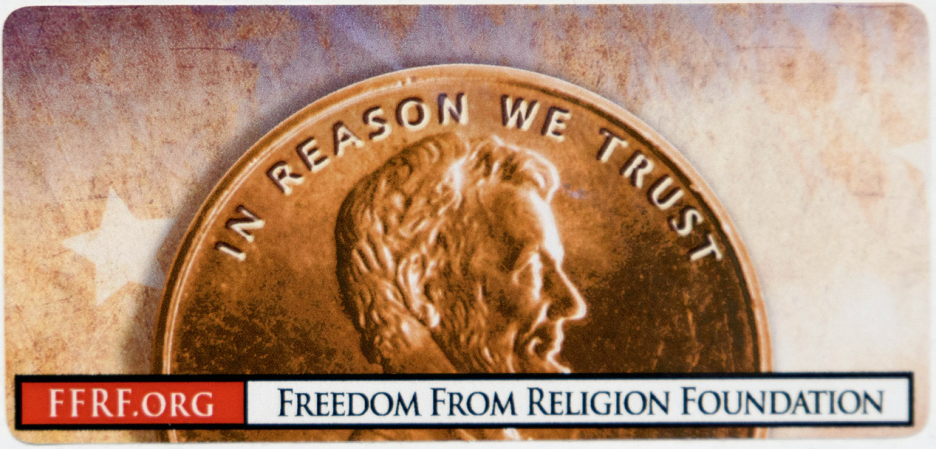 Freedom
From Religion Foundation (USA)
Freedom
From Religion Foundation (USA)
Ensuring the separation between church and state - Just as the Founding Fathers wanted.
- https://ffrf.org/
- https://en.wikipedia.org/wiki/Freedom_From_Religion_Foundation
- Freethought Matters (TV Show)
- https://ffrf.org/news/freethought-matters (locate a nearby Television Station)
- Freethought Matters (Video on the net).
- Americans United for separation of church and state.
- The Clergy Project (a self-help support group for church leaders who have lost their faith)
- The Real Reason 'In God We Trust' is on the U.S. dollar (begins in the year 1864)
- In Reason We Trust (Video - 1:35:28)
- Bible.
- http://www.deism.com/bibleorigins.htm
quote: The Bible was not handed to mankind by God, nor was it dictated to human stenographers by God. It has nothing to do with God. In actuality, the Bible was VOTED to be the word of God by a group of men during the 4th century A.D. (after receiving a lot of financial support by the Roman emperor Constantine)
- Many modern Christians believe the world is only 6,000 years old.
- Most do not know that this so-called fact comes to us from a 17th century Irish Bishop by the
name of Ussher who did so by tallying the begats found in bible genealogies (Adam begat Seth, Seth begat Enoch, etc.)
https://en.wikipedia.org/wiki/Ussher_chronology - However, Timothy 1:4 and Titus 3:9 instruct the faithful to "Avoid foolish questions and genealogies."
- Most do not know that this so-called fact comes to us from a 17th century Irish Bishop by the
name of Ussher who did so by tallying the begats found in bible genealogies (Adam begat Seth, Seth begat Enoch, etc.)
- http://skepticsannotatedbible.com/
- Contradictions (if the bible is a literally perfect book from God, then how are contradictions possible?)
http://skepticsannotatedbible.com/contradictions/by_name.html - Misogyny (would Jesus use these passages to legitimize and/or tolerate rape? I doubt it)
http://skepticsannotatedbible.com/women/long.html
- Contradictions (if the bible is a literally perfect book from God, then how are contradictions possible?)
- Asimov's Guide to the Bible
- a rational critique of both the Old and New Testaments
- according to Asimov (a non-practicing Jew), humanity should treat Bible stories the way we treat Greek myths.
- Just plain weird (here are just a few of the many strange things found in the bible)
- Everyone reading this already knows the story about God stopping the sun in the sky in Joshua-10 (which is retold in 2-Kings-20). God could have more-easily caused this battle to have been won just by causing the other side to fall by any quick-acting illness (dysentery springs to mind). If you believe that God stopped the sun in the sky (or more accurately, that the Earth was stopped from rotating for anywhere between 40 minutes and 23 hours), then you would probably believe anything including that David Copperfield actually employs real magic.
- Genesis-6
- So the LORD said, “My Spirit will not contend with man forever, for he is mortal; his days shall be 120 years.”
- The Nephilim (giants) were on the earth in those days, and afterward as well, when the sons of God (angels) had relations with the daughters of men. And they bore them children who became the mighty men of old, men of renown.
- Then the LORD saw that the wickedness of man was great upon the earth, and that every inclination of the thoughts of his heart was altogether evil all the time.…
- Ezekiel-23
- Yet she multiplied her promiscuity, remembering the days of her youth, when she had prostituted herself in the land of Egypt.
- and lusted after their lovers, whose genitals were like those of donkeys and whose emission was like that of stallions.
- So you revisited the indecency of your youth, when the Egyptians caressed your bosom and pressed your young breasts.…
- Revelation-14
- And I looked, and, lo, a Lamb (Jesus) stood on the mount Sion, and with him and hundred forty and four thousand, having his Father's name written in their foreheads.
- And I heard a voice from heaven, as the voice of many waters, and as the voice of a great thunder: and I heard the voice of harpers harping with their harps:
- And they sung as it were a new song before the throne, and before the four beasts, and the elders: and no man could learn that song but the hundred and forty and four thousand, which were redeemed from the earth.
- These are they which were not defiled with women; for they are virgins. These are they which follow the Lamb whithersoever he goeth. These were redeemed from among men, being the firstfruits unto God and to the Lamb.
- And in their mouth was found no guile: for they are without fault before the throne of God.
- http://www.deism.com/bibleorigins.htm
- The Nicene Creed is a verbal affirmation of what a church congregation believes about the New Testament
- It first appears in 325 A.D. under the first council of Nicaea when the Roman emperor Constantine was attempting to make Christianity the official state religion of the Roman empire.
- In the late sixth century (although some claim as early as 481 A.D.), the Latin-speaking churches (Rome) added the words "and from the Son" (Filioque).
I believe in the Holy Ghost, the Lord, the giver of life,
who proceedeth from the Father "and from the Son".
Who with the Father and the Son is adored and glorified. - The Eastern (orthodox) churches argued that this a violation of Canon VII of the Third Ecumenical Council, since the words were not included in the text by either the first Council of Nicaea (325 A.D.) or that of the first Council of Constantinople (381 A.D.)
- The Result:
- The Eastern Church is still referred to as "orthodox" (straight thinking)
- The opposite of "orthodox" is "heretical" (although some churches offer the word "heterodox" as a form of religious jujitsu)
- This means that Western churches (beginning with Roman Catholicism) are "heretical".
- If you ever prayed to Mary or any other saint, then you are a "heretic".
- If you ever prayed to Jesus, then you are a "heretic".
- This also means that most everything derived from Roman Catholicism (including all the Protestant sects) are "heretics".
- includes: Lutherans, Calvinists, Baptists, Anglicans, Anabaptists (Amish, Hutterites, Mennonites, etc.), Episcopalians, Mormons just to name a short list of many.
- possible exceptions: any Christian sects that see Jesus as either a prophet or perfect sacrifice but not a deity. Includes Unitarians and possibly Quakers.
comment1: in a recent biography of Michael Faraday I read that he was raised in the Sandemanian faith which I had never heard about. This is an off-shoot of the Church of Scotland (home of the Enlightenment) with the Sandemanians believing that: "Jesus lived, was put to death for our sins" and "that everything after the death of Jesus, including the resurrection up to the ascension were fabrications". After reading this I thought to myself: "hey I might be Sandemanian".
comment2: there are so many Christian sects today that even the Christians cannot keep up with them all. But I think a clear distinction can be made between the Unitarians (who do not profess a belief in a "triune god" or "the trinity") and everyone else who might be better described as Trinitarians.
comment3: I never heard the phrase "the enlightenment" during my years in Canadian primary and secondary schools (K-13). Was this due to the efforts of well-meaning (but misguided) protestant teachers and school boards? Perhaps.
- More (links, etc.)
- www.skeptic.com - promoting science and critical thinking.
- https://americanhumanist.org
- https://humanistpress.com
- http://biologos.org - is a science site for modern open-minded Christians.
- Development of the Canon of the New Testament.
- Christian bible scholars like Bart Ehrman tell us that half of the books of the 27 books of the New Testament are Pseudepigraphs (forgeries). It does not matter how well intentioned the authors were, if you are serious about religion then you had better not teach from the forgeries especially where they knowingly conflict with other teachings.
- The Gospel of Matthew - contrary to popular belief by commoners, this book was not written until 40 years after the death of Christ.
- Four Document Hypothesis @wikipedia
- Synoptic Problem @wikipedia
- The Clergy Project (a self-help support group for church leaders who have lost their faith)
- Miscellaneous Stuff.
- My Christianity Clarifications page.
- My Dark Age page.
- My Enlightenment page.
- My Changing World Views page.
- My Personal Eschatology (or too many spicy foods?)
- Christopher Hitchens
- Alan Watts
- www.the-brights.net
- Brights movement @wikipedia.
- the-bright-stuff.pdf (my local copy)
- My cache of Deism articles
- My cache of Humanity articles
 Back to Home
Back to HomeNeil Rieck (rationalist, humanist, deist)
Waterloo, Ontario, Canada.